
Paul Muni was an American stage and film actor from Chicago. He started his acting career in the Yiddish theater and during the 1930s, he was considered one of the most prestigious actors at the Warner Bros. studio and was given the rare privilege of choosing his own parts.

Scarface is a 1932 American gangster film directed by Howard Hawks and produced by Hawks and Howard Hughes. The screenplay, by Ben Hecht, is based loosely on the novel first published in 1930 by Armitage Trail, which was inspired by Al Capone. The film was developed and released during the pre-Code era of Hollywood. The film stars Paul Muni as Italian immigrant gangster Antonio "Tony" Camonte who violently rises through the Chicago gangland, with a supporting cast that includes George Raft and Boris Karloff. Camonte's rise to power dovetails with his relentless pursuit of his boss's mistress while his own sister pursues his best hitman. In an overt tie to the life of Capone, a version of the Saint Valentine's Day Massacre is depicted.
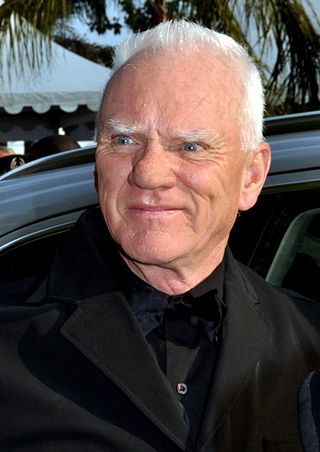
Malcolm McDowell is an English actor. He first became known for portraying Mick Travis in Lindsay Anderson's if.... (1968), a role he later reprised in O Lucky Man! (1973) and Britannia Hospital (1982). His performance in if.... prompted Stanley Kubrick to cast him as Alex in A Clockwork Orange (1971), the role for which McDowell became best known.

Paul Bettany is an English actor. He is best known for his roles as J.A.R.V.I.S. and Vision in the Marvel Cinematic Universe, including the Disney+ miniseries WandaVision (2021), for which he garnered a Primetime Emmy Award nomination.

Sexy Beast is a 2000 black comedy crime film directed by Jonathan Glazer and written by Louis Mellis and David Scinto. It stars Ray Winstone, Ben Kingsley, and Ian McShane. It follows Gary "Gal" Dove (Winstone), a retired criminal visited by a sociopathic gangster (Kingsley) who demands that he take part in a bank robbery in London.

David Wheeler, better known as David Thewlis, is an English actor and filmmaker. He is known as a character actor and has appeared in a wide variety of genres in both film and television. He has received the Cannes Film Festival Award for Best Actor and nominations for two BAFTA Awards, a Golden Globe Award, a Primetime Emmy Award, and a Screen Actors Guild Award.

Jonathan Glazer is an English film director and screenwriter. He began his career in theatre before transitioning into film, directing the features Sexy Beast (2000), Birth (2004), Under the Skin (2013), and The Zone of Interest (2023).
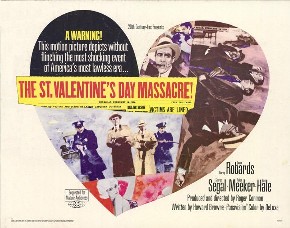
The St. Valentine's Day Massacre is a 1967 American gangster film based on the 1929 mass murder of seven members of the Northside Gang on orders from Al Capone. The picture was directed by Roger Corman, written by Howard Browne, and starring Jason Robards as Capone, Ralph Meeker as Moran, George Segal as Peter Gusenberg, and David Canary as Frank Gusenberg.
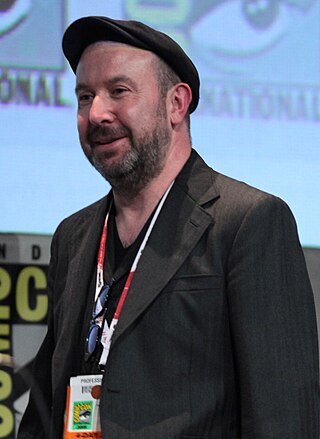
Paul McGuigan is a Scottish film and television director, best known for directing films such as Lucky Number Slevin, Gangster No. 1 and Push. He has also directed episodes of Sherlock, Scandal, Monroe and Smash. He was born in Bellshill Maternity Hospital, Scotland.
The Irish Mob is a usually crime family–based ethnic collective of organized crime syndicates composed of primarily ethnic Irish members which operate primarily in Ireland, the United States, the United Kingdom, Canada and Australia, and have been in existence since the early 19th century. Originating in Irish-American street gangs – famously first depicted in Herbert Asbury's 1927 book, The Gangs of New York – the Irish Mob has appeared in most major U.S. and Canadian cities, especially in the Northeast and the urban industrial Midwest, including Boston, New York City, Philadelphia, Pittsburgh, Baltimore, Cleveland, and Chicago.
Louis Mellis is a Scottish actor and screenwriter.

44 Inch Chest is a 2009 British crime comedy-drama film directed by Malcolm Venville in his directorial debut. The film stars Ray Winstone, Ian McShane, John Hurt, Tom Wilkinson, Stephen Dillane and Joanne Whalley. The film was released on 19 October 2009.
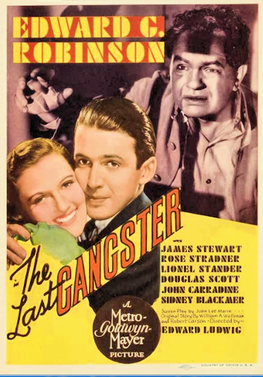
The Last Gangster is a 1937 American crime drama film directed by Edward Ludwig and starring Edward G. Robinson and James Stewart. The supporting cast features Rose Stradner, Lionel Stander and John Carradine.
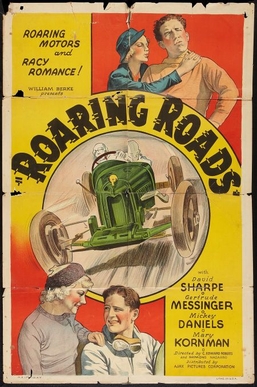
Roaring Roads is a 1935 American action film directed by Charles E. Roberts and Ray Nazarro. It featured three actors from the Our Gang films: David Sharpe, Mary Kornman and Mickey Daniels. It was the second and last film in the series Our Young Friends, the first being Adventurous Knights.
The Baskerville Hounds are an American garage rock group from the West Park neighborhood of Cleveland, Ohio, United States. In October 1969, they had a single hit on the Billboard Hot 100: "Hold Me" which peaked at number 88 and was on the charts for two weeks.
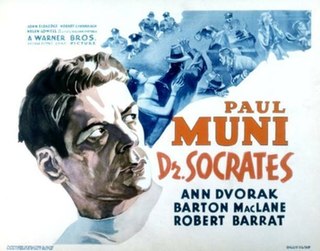
Dr. Socrates is a 1935 American crime film directed by William Dieterle and starring Paul Muni as a doctor forced to treat a wounded gangster, played by Barton MacLane.
British Gangsters: Faces of the Underworld is a documentary series about UK gangsters or 'Faces'. Series 1, Series2 it based on the book Faces by Brian Anderson

Legend is a 2015 biographical crime drama thriller film written and directed by American director Brian Helgeland. It is adapted from John Pearson's book The Profession of Violence: The Rise and Fall of the Kray Twins, which deals with their career and the relationship that bound them together, and follows their gruesome career to life imprisonment in 1969.

Bohemian Rhapsody is a 2018 biographical musical drama film that focuses on the life of Freddie Mercury, the lead singer of the British rock band Queen, from the formation of the band in 1970 to their 1985 Live Aid performance at the original Wembley Stadium. It was directed by Bryan Singer from a screenplay by Anthony McCarten, and produced by Graham King and Queen manager Jim Beach. It stars Rami Malek as Mercury, with Lucy Boynton, Gwilym Lee, Ben Hardy, Joe Mazzello, Aidan Gillen, Tom Hollander, and Mike Myers in supporting roles. Queen members Brian May and Roger Taylor also served as consultants. A British-American venture, it was produced by Regency Enterprises, GK Films and Queen Films, and was distributed by 20th Century Fox.















